Chinese Language Education Sees Remarkable Results in Tunisia After Over Four Decades
Information Sources:Xinhua News Agency
As early as the 1970s, Tunisia was among the first countries to introduce Chinese language teaching into its national education system. During the last four decades, Chinese language education activities, from establishing undergraduate programs in Chinese language, organizing the "Chinese Bridge" Chinese language proficiency competitions to founding Confucius Institutes, have served as an important bridge for the linguistic and cultural exchanges between China and Tunisia. In recent years, with increasingly close political, economic, and cultural exchanges with China, Tunisia's demand for professionals with Chinese language skills has grown rapidly.
Chebil, Pioneer of Chinese Language Teaching in Tunisia
Founded in 1964, the Higher Institute of Languages at the University of Carthage, Tunisia is a public university accredited to offer undergraduate and master's degree programs in Chinese. It was formerly known as the Burjiba Institute of Modern Languages and changed to its current name in 1998. In 1977, the Burjiba Institute of Modern Languages began to offer a four-year undergraduate program in Chinese. In the same year, it enrolled six local students and hired an international Chinese language teacher to teach Chinese there, thus introducing Chinese language education into Tunisia.
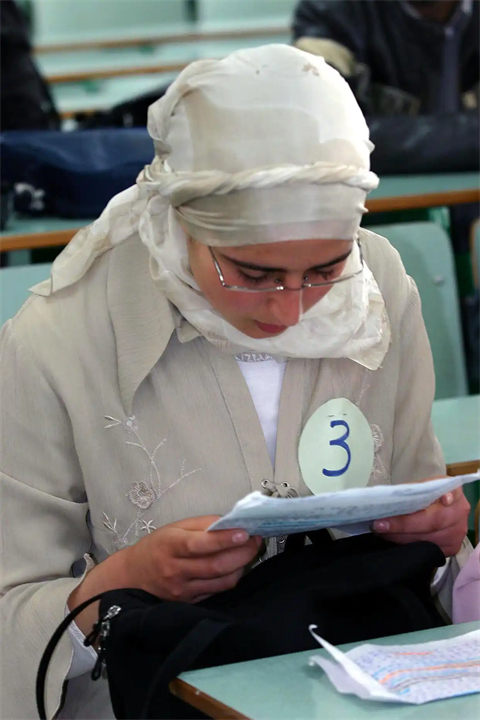
On April 28, 2006, contestants of the "Chinese Bridge" Chinese Proficiency Competition for Foreign College Students in Tunis were making final preparations in a classroom of the Chinese Department, Tunisian Higher Institute of Languages. Photo by reporter Liu Shun of Xinhua News Agency.
The promotion of Chinese language education in Tunisia is largely attributable to the efforts of Lotfi Chebil, the first local Chinese language teacher at the Burjiba Institute of Modern Languages.
In 1976, Chebil won a scholarship to study in China and entered the then Beijing Language Institute. Four years later, he received a bachelor's degree in Chinese linguistics. During his study in China, he traveled throughout Beijing and visited Shanghai, Guangzhou, Xi'an, Guilin, and other cities. This experience led him to set two goals - to open a Chinese language program at a Tunisian university and to offer a Chinese language course at a Tunisian high school.
In 1980, Chebil left Beijing after graduation and went to France to study for a doctorate in Chinese. In 1984, he became the first doctor in Tunisia to specialize in Chinese. After graduation, he was employed by a French information technology company to develop Chinese character input technology. In 1988, he returned to Tunisia to teach Chinese at the Burjiba School of Modern Languages. In 1992, he became dean of the language department of that school.
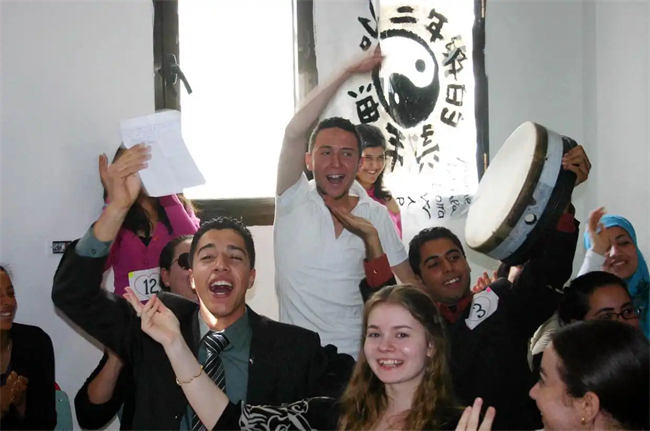
On April 22, 2008, students rooted for contestants at the 7th "Chinese Bridge" Chinese Proficiency Competition for Foreign College Students in Tunis held at the Higher Institute of Languages in Tunis. Photo by reporter Liu Shun of Xinhua News Agency.
In 1998, due to the efforts of Chebil and other parties concerned, the Tunisian Ministry of Higher Education and Scientific Research approved the upgrade of Chinese from a university elective course to an undergraduate program. In 2003, the Tunisian Ministry of Education in charge of primary and secondary school affairs approved the introduction of Chinese courses into some high schools as a third elective foreign language course, and appointed excellent college graduates majoring in Chinese at Tunisian universities to teach in those schools.
"Chinese Bridge" Competition Promotes Chinese Learning
To promote Chinese culture and Sino-foreign exchanges and cooperation, China began to hold the "Chinese Bridge" Chinese Proficiency Competition for Foreign College Students in 2002. Today, the annual contest has been held in Tunisia for 23 consecutive years.
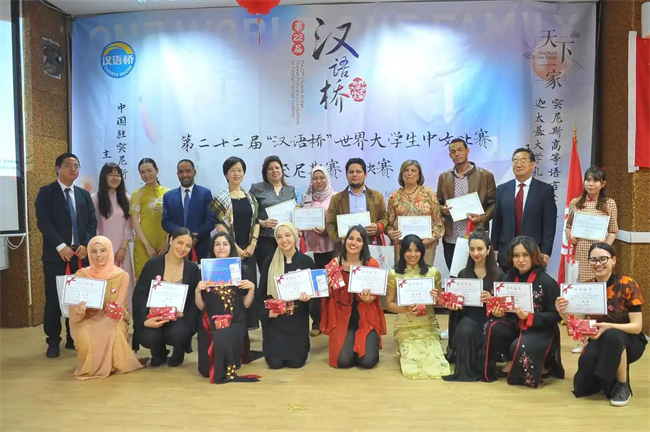
On May 31, 2023, contestants and distinguished guests who participated in the final of the "Chinese Bridge" Chinese Proficiency Competition for Foreign College Students in Tunis took a group photo in Tunis, the capital of Tunisia. Photo by Adel/Xinhua News Agency.
According to Li Wenjie, head of the Cultural Department of the Chinese Embassy in Tunisia, since the "Chinese Bridge" competition was introduced in 2002, Chinese programs at Tunisian universities/colleges and Chinese learners across Tunisia have been actively participating in the competition. Through the "Chinese Bridge" competition, some contestants have gained the opportunity to further their Chinese studies in China and, in turn, started a career in Sinology, Arabic-Chinese translation, or Chinese language teaching. Today, among the local Chinese teachers in Tunisian colleges and universities, many have participated and excelled in the "Chinese Bridge" competition during their school days.
In 2007, at the age of 23, Khalid Haji Ahmed participated in the "Chinese Bridge" competition during his senior year in college. Because of his outstanding performance in the competition, the Chinese government offered him the opportunity to study Chinese at Beijing Language and Culture University. After a month of study there, Khalid chose to learn Chinese at the Southwest University of Finance and Economics in Chengdu for another six months. In 2007, he graduated with honors from the Higher Institute of Languages at the University of Carthage and was granted an opportunity to study in China by the Tunisian Ministry of Higher Education and Scientific Research, as well as a full scholarship by the Chinese government. In 2008, Khalid returned to China and obtained a master's degree in Chinese after three years' study at Beijing Language and Culture University. In 2011, he received a scholarship again and began to pursue a doctoral degree at Beijing Language and Culture University.
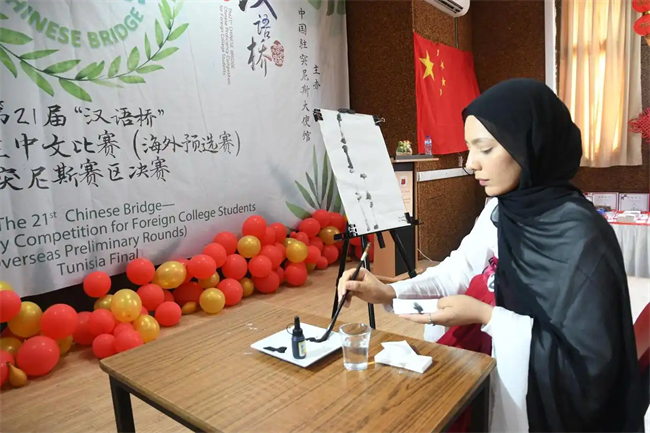
On June 9, 2022, contestants showed their talents at the final of the "Chinese Bridge" Chinese Proficiency Competition for Foreign College Students in Tunis, the capital of Tunisia. Photo by Adel/Xinhua News Agency.
While studying and living in Beijing, Khalid fell in love with and married Furong, an Egyptian student studying in China. Back then, Furong was also working for her Ph. D. in Chinese Applied Linguistics at Beijing Language and Culture University. In 2014, Khalid and his wife returned to Tunisia and began to teach Chinese at the Higher Institute of Languages, University of Carthage. In 2020, Khalid was appointed dean of the university's Department of Oriental Languages, responsible for instruction of the Chinese and Russian language programs. In addition to teaching Chinese at his own university, Khalid also actively helped other Tunisian universities to offer elective Chinese language courses.
According to Houda Ben Hamadi, Dean of the Higher Institute of Languages and Director of the Confucius Institute at the University of Carthage, the "Chinese Bridge" competition has become a driving force for Tunisian students to learn Chinese, and a growing number of Tunisians are showing a strong interest in Chinese culture.
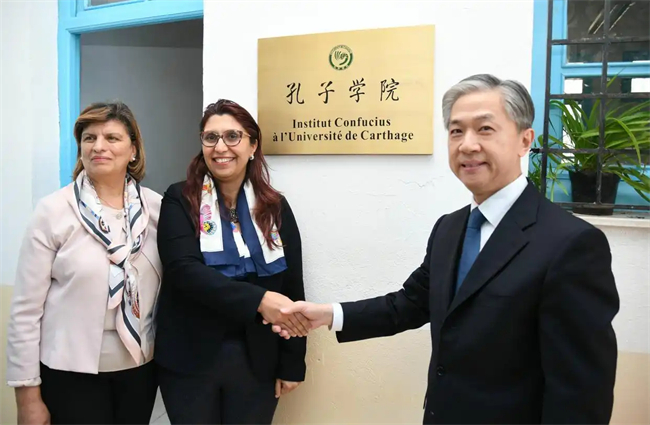
On November 12, 2018, in Tunis, the capital of Tunisia, Wang Wenbin (right), then Chinese Ambassador to Tunisia, shook hands with Olfa Ouda (middle), President of the University of Carthage, at the opening ceremony of the university's Confucius Institute. Photo by Adel/Xinhua News Agency.
Confucius Institute Promotes the Spread of Chinese Language
In 2019, the first Confucius Institute in Tunisia, co-sponsored by Dalian University of Foreign Studies and the University of Carthage, was officially opened. The institute is committed to Chinese language teaching, Chinese teacher training, and cultural activities. At present, it is the only HSK testing center in Tunisia.
According to Ru Xin, Chinese Director of the Confucius Institute at the University of Carthage, more than 2,000 Tunisian students have studied Chinese here since its operation, and the number is still on the rise. The HSK test is divided into six levels, and students who have passed level four or above are able to work independently in Chinese, Ru Xin said. In March this year, Liangyu, a student from the Confucius Institute at the University of Carthage, passed the HSK level 5 test and was granted a scholarship by the Chinese government to pursue a master's degree in Teaching Chinese to Speakers of Other Languages (TCSOL) at Minzu University of China this September.
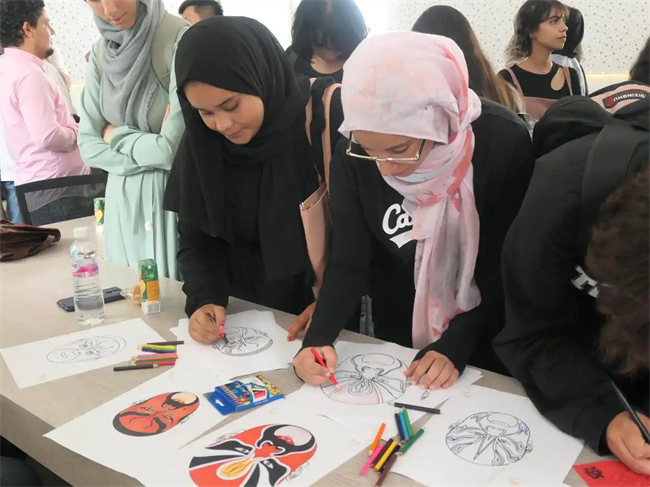
On September 27, 2022, students portrayed Peking Opera masks to celebrate the Confucius Institute Day at the University of Carthage in Tunis, the capital city of Tunisia. Photo by Xinhua News Agency.
In addition to organizing Chinese language teaching and HSK tests for Tunisian students, the Confucius Institute at the University of Carthage is actively conducting local Chinese language teacher training for Tunisian universities and secondary schools. According to Ru Xin, the Confucius Institute organizes activities such as training local Chinese teachers for Tunisian high schools and holding teaching workshops annually. These activities aim to enhance local teachers' knowledge of Chinese and their teaching skills, thereby helping them perform their daily teaching duties more effectively.
All-round Close Communication Helps to Make Dreams Come True
In recent years, with increasingly close political, economic, and cultural exchanges between China and Tunisia, the latter's demand for professionals with Chinese language skills has grown rapidly.
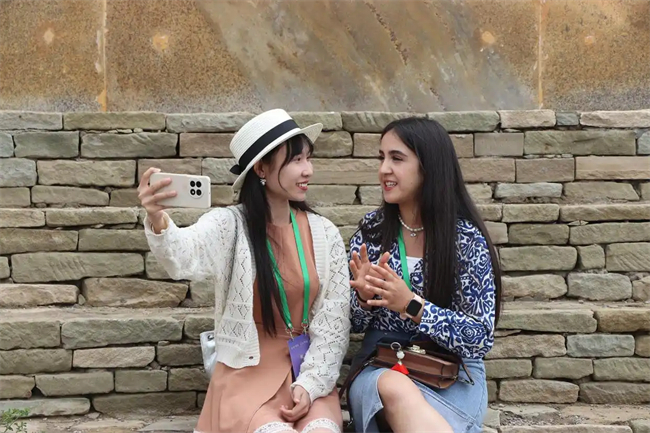
Tunisian Vlogger Derouiche Asma, 25, is recording videos with Chinese friends in Xi'an (file photo).
Photo by Xinhua News Agency.
According to Tunisian President Kais Saied, nowadays, more and more Tunisian youths are learning Chinese in the belief that China is going to play a more important role in the international community. Xiaoguang, a 21-year-old Tunisian woman, is one of the youths referred to by President Saied. She is a graduate of the Higher Institute of Languages at the University of Carthage, with a bachelor's degree in Chinese. "I became interested in Chinese culture and Chinese TV dramas when I was 18. In my free time, I often watch Chinese TV dramas or listen to Chinese music. That's why I ended up majoring in Chinese at university - I have always had a deep interest in Chinese literature and art." she said.
In September 2023, as an exchange student, Xiaoguang went to study at Beijing Language and Culture University for 5 months. As she learned more about China, her determination to continue learning Chinese grew even stronger. Speaking of her postgraduate study plans, Xiaoguang said that she wanted to study journalism at Fudan University, so that she could interview a wide range of people and learn about the cultures of other countries after graduation.
"My mother tongue is Arabic, and I can also speak Chinese, French and English." she said. "I hope to get a job in China or the Gulf Arab countries in the future and become a famous journalist."

